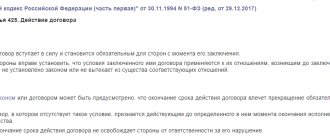Calculating deadlines. How to avoid mistakes
Deadlines in civil legal relations are of enormous importance, but the attitude towards them is rather careless. Meanwhile, sometimes even a one-day delay can be critical.
The course of a period defined by a period of time begins the next day after the calendar date or the occurrence of an event that determines its beginning (Article 191 of the Civil Code of the Russian Federation).
The rules for determining the end of the period are established in Article 192 of the Civil Code of the Russian Federation. If the period is calculated:
- years, then it expires in the corresponding month and day of the last year of the period (clause 1 of Article 192 of the Civil Code of the Russian Federation);
- months, then it expires on the corresponding date of the last month of the period (clause 3 of Article 192 of the Civil Code of the Russian Federation);
- weeks, then it expires on the corresponding day of the last week of the period (clause 4 of Article 192 of the Civil Code of the Russian Federation).
The period begins not on the day on which its beginning is determined, but on the next day. Therefore, difficulties often arise in determining the last day of the deadline.
The Supreme Arbitration Court of the Russian Federation in the resolution of the Plenum of the Supreme Arbitration Court of the Russian Federation dated December 25, 2013 No. 99 “On procedural deadlines” explained that the expiration date of the term corresponds to the determining date (clause 2). This means that if the defining date for a monthly period is the 10th day, then the start date of this period is the 11th day, and the date of the last day of the period is the 10th day of the next month (or, if it is a non-working day, the next followed by a working day (Article 193 of the Civil Code of the Russian Federation)).
Two important tips:
- It is more appropriate to define the most important dates by specific dates;
- Regular monitoring of debts is the key to ensuring that you do not miss the statute of limitations on disputes (and above all, on disputes regarding the collection of receivables).
By the way, if the contract period is set “until December 31,” then from a formal point of view it is valid until December 30 inclusive. Courts, as a rule, proceed from the fact that the date after the preposition “before” is not included in the period determined by the contract.
If deadlines are defined in days, then the flow of such deadlines also begins from the next day after the date or event that determines the beginning of the period (Article 191 of the Civil Code of the Russian Federation).
Meanwhile, there are deadlines for which missing even one day can be fatal. Thus, the law names the following pretrial periods.
Statute of limitations
Missing even one day will result in the claim being denied. Claims brought with an omission of the statute of limitations, if the omission was declared by the other party to the dispute, are not subject to satisfaction (clause 2 of article 199 of the Civil Code of the Russian Federation). At the same time, there is no possibility for organizations to restore the deadline - only for citizens (Article 205 of the Civil Code of the Russian Federation).
Duration of power of attorney
It is known that upon expiration of the power of attorney, the representative loses his powers. What consequences the expiration of the power of attorney will entail depends on the actions for which it was issued.
Suppose the power of attorney to represent interests in court has expired. If the application (complaint) is filed after the expiration of the power of attorney, then it is considered filed by a person who does not have the authority to perform the relevant procedural actions, and the court leaves the statement of claim (complaint) without consideration (clause 7, part 1, article 148, clause 1 part 1 article 264, clause 1 part 1 article 281, clause 3 part 1 article 315, clause 1 part 1 article 296 of the Arbitration Procedure Code of the Russian Federation).
However, some courts consider it possible to leave the application (complaint) without progress, setting a deadline for submitting a valid power of attorney (such a decision was made, in particular, by the Federal Antimonopoly Service of the West Siberian District dated October 11, 2007 No. A45-3814/2007-29/56), but You shouldn't count on it.
If the power of attorney has expired after the initiation of proceedings on the claim (complaint), then the representative under such power of attorney is not allowed to participate in the court hearing. No, he has the right to be present at the court hearing (otherwise it would mean a violation of the principle of openness of the court session), but he has the right to give explanations, present evidence, etc., since he does not have the authority of a representative (Article 62 of the Arbitration Procedure Code of the Russian Federation).
If the power of attorney for concluding an agreement has expired and the agreement is signed by a representative, then the courts will most likely recognize such an agreement as void. If the agreement is not signed by a person authorized to complete the transaction, then the mandatory written form (Article 160 of the Civil Code of the Russian Federation) has not been observed, i.e. the agreement is void due to the fact that it contradicts the law (determination of the Supreme Arbitration Court of the Russian Federation dated December 7, 2007 No. 15573/07 ).
If a transaction concluded by an unauthorized person is not subsequently approved by the represented person, then it is considered concluded on behalf and in the interests of the person who completed it (Article 183 of the Civil Code of the Russian Federation). If approval has taken place, then the transaction gives rise to rights and obligations for the represented person.
Deadline for concluding the main contract
The period for concluding the main contract is indicated in the preliminary contract. If it is not defined, then it is equal to a year from the moment of conclusion of the preliminary agreement (Clause 4 of Article 429 of the Civil Code of the Russian Federation). Difficulties arise when this period is set in years, months or weeks.
The law establishes that the obligations stipulated by the preliminary agreement are terminated if, before the end of the period within which the parties must conclude the main agreement, it is not concluded or one of the parties does not send the other party an offer to conclude this agreement (Clause 6 of Article 429 of the Civil Code of the Russian Federation ).
An offer to conclude a main contract made after the deadline established in the preliminary contract no longer has legal significance. Even if it is late by at least one day, the counterparty cannot be forced to enter into an agreement through the court.
Deadline for filing claims in a bankruptcy case
It is possible to submit claims at any stage of bankruptcy, but no later than two months from the date of publication of information about declaring the debtor bankrupt and about the opening of bankruptcy proceedings, and after this period the register of creditors is closed (clause 1 of Article 142 of the Federal Law of October 26, 2002 No. 127 - Federal Law “On Insolvency (Bankruptcy)”). I would say that the possibility of restoring this period is approaching zero. No, theoretically, it is possible for a creditor to make claims after the registry is closed, but these claims are satisfied at the expense of the debtor’s property remaining after satisfying the claims of creditors included in the registry, if these late claims do not belong to the claims of the first or second priority. Thus, the possibility for a late creditor to receive anything for claims submitted after the closure of the register is very small.
Deadline for detecting defects in goods (works)
The buyer has the right to make claims related to defects in goods if they are discovered within the time limits specified in Article 477 of the Civil Code of the Russian Federation.
If the product does not have a warranty period or expiration date, then claims related to defects in the product may be presented by the buyer, provided that the defects in the sold product were discovered within a reasonable time, but within two years from the date of transfer of the product to the buyer or within a longer period when such a period is established by law or the purchase and sale agreement.
If a warranty period is established, the buyer has the right to make claims related to defects in the product if defects are discovered during the warranty period.
If a product has an expiration date, the buyer has the right to make claims related to defects in the product if they are discovered during the shelf life of the product.
If the warranty period provided for in the contract is less than two years and defects in the goods are discovered by the buyer after the expiration of the warranty period, but within two years from the date of transfer of the goods to the buyer, the seller is liable if the buyer proves that the defects in the goods arose before the transfer of the goods to the buyer or for reasons that have arisen up to this point.
Incorrect calculation of the warranty period or two-year period established for a product may lead to negative consequences for both the buyer and the seller.
If the buyer goes to court with claims related to defects in the goods, believing that the deadlines have been met, but the court believes otherwise, then the buyer will lose not only time, but also the legal costs incurred.
The seller suffers in a similar way if he refuses to satisfy the buyer’s demands, believing that the deadlines have been missed. In addition, for the delay in returning the money paid for the goods, the seller in this case will have to pay interest for the use of other people's funds in accordance with Article 395 of the Civil Code of the Russian Federation.
Contract time
After the expiration of the contract, it is not possible to demand the counterparty to fulfill the obligation; one can only present demands for liability for violation of obligations.
In relation to lease agreements, the period of notification of the intention to extend the agreement for a new period is often tied to the expiration date of the agreement (clause 1 of Article 621 of the Civil Code of the Russian Federation). Consequently, if the last day of the contract is incorrectly determined, the last day of the period for such notification may be missed.
As a general rule, an agreement comes into force from the date of its conclusion (clause 1 of Article 425 of the Civil Code of the Russian Federation) - most agreements contain such a condition.
The date of conclusion of the contract is considered to be the receipt by the person who sent the offer of its acceptance (clause 1 of Article 433 of the Civil Code of the Russian Federation), and the contract comes into force immediately on the day it is signed by both parties, and not the next day, i.e. the rule of Article 191 of the Civil Code The Russian Federation does not apply in this case. Thus, an agreement signed on July 1 for a year will begin to operate on July 1, and not on the second.
The Civil Code of the Russian Federation does not establish specific rules regarding the expiration of contracts.
Unlike ordinary terms, the beginning of the contract period and the defining date coincide; the calculation of the last date of the term in this example does not correspond to the calendar flow of time.
Duration of the lease agreement
If the lease agreement came into force on the 1st day of the month, then the last day of the lease period will not be the 1st, but the 30th (or 31st) day. The specified agreement expires on the 31st, not the 1st - at least, this approach prevails in judicial practice.
But if the lease agreement was not concluded on the first day, then, as a rule, the terms are calculated according to the usual rules. That is, if the contract was concluded on the 30th for eleven months, then it will begin to operate on the 31st.
This approach is also supported by the position of the Presidium of the Supreme Arbitration Court of the Russian Federation, which clarified that the validity period of the lease agreement for a building (structure), determined from the 1st day of any month of the current year to the 30th (31st) day of the previous month of the next year, is recognized equal to a year (clause 3 of the information letter of the Presidium of the Supreme Arbitration Court of the Russian Federation dated January 11, 2002 No. 66).
Terms of other contracts
Federal Law dated June 3, 2011 No. 107-FZ “On the Calculation of Time” established what is obvious to everyone:
- calendar week - a period of time from Monday to Sunday lasting 7 calendar days;
- calendar year - a period of time from January 1 to December 31, lasting 365 or 366 (leap year) calendar days (Article 2 of Law No. 107-FZ), etc.
In paragraph 2 of Article 3 of this law it is established that the provisions of federal laws and other regulatory legal acts of the Russian Federation concerning the legal basis for calculating time are applied to the extent that does not contradict this law.
Thus, a weekly period determined for the purposes of civil law cannot exceed seven days, and a yearly period cannot exceed three hundred sixty-five days (if the year is not a leap year), etc.
Since there is no established judicial practice for applying this law, the best option would be to set a specific date rather than specify a time period.
IMPORTANT
Claims brought with an omission of the statute of limitations, if the omission was declared by the other party to the dispute, are not subject to satisfaction (clause 2 of article 199 of the Civil Code of the Russian Federation). At the same time, there is no possibility for organizations to restore the deadline - only for citizens (Article 205 of the Civil Code of the Russian Federation).
The period for concluding the main contract is indicated in the preliminary contract. If it is not defined, then it is equal to a year from the moment of conclusion of the preliminary agreement (Clause 4 of Article 429 of the Civil Code of the Russian Federation). Difficulties arise when this period is set in years, months or weeks.
After the expiration of the contract, it is not possible to demand the counterparty to fulfill the obligation; one can only present demands for liability for violation of obligations.
A weekly period determined for the purposes of civil law cannot exceed seven days, and a yearly period cannot exceed three hundred sixty-five days (unless the year is a leap year).
Andrey KORMAKOV, lawyer
Form of a written agreement
According to the provisions of Art. 434 of the Civil Code of the Russian Federation, a written agreement can be in the form of a single document signed by the parties, or in the form of an exchange of letters, electronic documents and other data. In some cases, a written agreement can be concluded only in the form of one document.
Most often, a written form of agreement is used in the form of a single document.
The form of a written contract is a set of all necessary conditions that are essential for a particular type of contract, and on which the parties have reached agreement.
As a rule, contracts are divided into sections in which certain provisions are specified, for example, the subject of the contract, the rights and obligations of the parties, etc. Each section has a title and is sometimes numbered.
Each section has its own clauses or separate paragraphs; numbering is at the discretion of the parties.
When drawing up, the agreement is either stapled and signed by the parties, or not stapled and signed at the end by the parties, and the parties can also put their signatures on each page of the agreement to avoid substitution of the pages of the agreement by an unscrupulous party.
If there are any forms to the agreement, for example, a transfer and acceptance certificate, then it is better not to sign them, but to put signatures at the bottom of the page, you can write that the form of the act has been agreed upon and sign it.
Remote drafting of contracts
Remote execution of contracts assumes that the parties do not meet with each other. How can you conclude a contract remotely?
- The first way to remotely register and conclude an agreement is to exchange documents by sending them by Russian post.
- The second method is the exchange of documents in electronic form, which are signed with electronic signatures . This method of remote execution of contracts, for example, is used when signing state and municipal contracts based on the results of electronic procedures on electronic platforms, when signing contracts on the websites of commercial organizations, etc.
- The third way to remotely execute an agreement may be that the parties write in the agreement that it is considered signed by the party if a signed scanned copy of the agreement in PDF form is sent to the other party . Or stipulate that, for example, documents sent by a party from the specified email address are considered signed by it.
The most reliable way to execute an agreement remotely is, at a minimum, to duplicate the agreement by Russian post and hand-sign it by each party. That is, the parties can agree to sign an agreement, for example, by exchanging scanned documents by email, as well as additionally sending a document signed on paper by Russian post.
Documents for execution of the contract
Among the documents that may be needed in this case are:
For an individual:
- identification documents (mainly passport);
- documents certifying his actual place of residence and registration;
- marriage certificate (if the person is in a marital relationship);
- power of attorney, if a person acts on behalf of another person;
- documents regarding the agreement being concluded;
- other necessary papers that may be needed.
For legal entities:
- constituent documents;
- passport of the legal entity’s representative;
- a power of attorney or any document certifying that a particular body or representative is acting on behalf of a legal entity;
- documents regarding the agreement being concluded;
- other necessary papers that may be needed.
These are the main papers required in such cases. But what documents are needed to draw up a contract depends more specifically on what kind of plan it is. And the answer to this question can be obtained from a lawyer only when the object and type of the contract become known.
It is worth saying that the rules for drawing up a contract are mostly the same for everyone. Let us repeat once again, it all depends on what type of document and what is its object.
Mistakes when writing a contract
When drawing up contracts, the parties may make mistakes, including the following:
- failure to indicate the date of conclusion of the contract
- not specifying the duration of the contract
- failure to specify the subject of the contract
- failure to agree on conditions in the contract that are essential for this type of contract
- incomplete indication of information about the parties to the agreement
- failure to indicate emails, if there are conditions for the exchange of documents at the email addresses specified in the contract
- typos in the contract that change the meaning of the terms of the contract
- indication in the contract and signing of the contract by an unauthorized person
- failure to indicate in the contract the contract price or the procedure for determining it
- other errors that may lead to inconsistency of certain terms of the contract and to difficulties in resolving disputes between the parties






